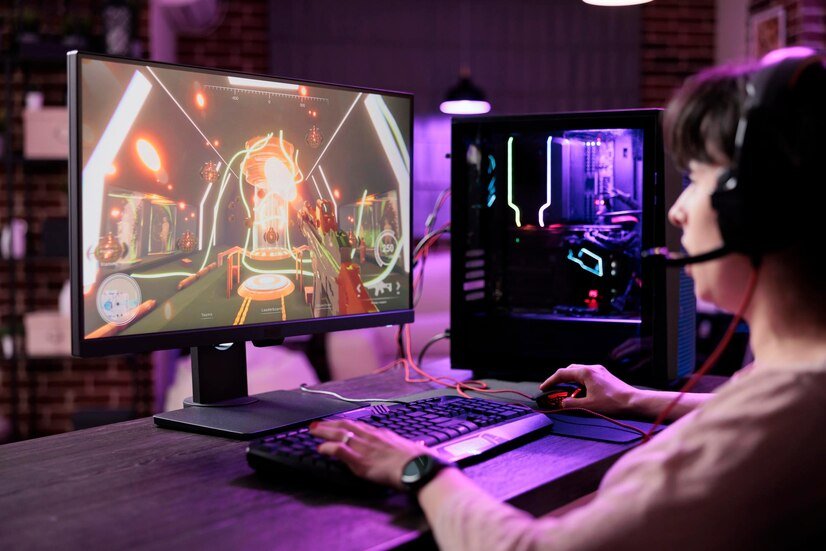Mastering Game Development with https// GameMakerBlog.net

Do you aspire to create the next iconic game? Maybe you’ve spent hours strategizing in your favorite RPG, or imagining your spin on a new battle royale. Whether you’re a gamer ready to jump into the world of game development or a seasoned developer looking to refine your craft https// GameMakerBlog.net is here to guide you.
This post will walk you through key aspects of game-making—from understanding your audience and mastering the basics to exploring advanced techniques and marketing strategies. Plus, we’ll discuss exciting shifts in the world of game development, including emerging tech like AI, VR, and AR.
By the end, you’ll have a clear plan and the tools you need to elevate your game-making skills.
Understanding Your Audience
Every great game starts with one question: “Who am I creating this for?” The gaming community is vast and diverse; understanding your audience is critical to crafting an experience they’ll love.
Know Your Players
Before starting development, research different gamer demographics. From casual mobile players to hardcore console enthusiasts, each group has unique preferences. For example:
- Teens: Often enjoy competitive multiplayer games or visually stunning action titles.
- Adults: May prefer story-driven experiences or games with nostalgic value.
- Everyone: Puzzle games and mobile offerings often appeal to a wide range of players, thanks to their accessibility.
Spot Game Trends
Keep an eye on current gaming trends. Are sandbox experiences in demand? Is roguelike gameplay a hit this year? Analyze popular genres, mechanics, and art styles to align your game concept with what resonates today. This insight will help you gain traction in a competitive market.
The Basics of Game Making
From Concept to Launch
Game development is as much about strategy as creativity. Here’s a simplified breakdown of the process:
- Brainstorming: Fine-tune your game’s mechanics, genre, and story.
- Prototyping: Create a rough, playable version of your idea to test functionality.
- Development & Coding: Build your game using platforms like https// GameMakerblog.net Studio, Unity, or Unreal Engine.
- Testing: Conduct extensive bug-testing to ensure a smooth player experience.
- Launch: Publish your game on platforms such as Steam, mobile app stores, or consoles.
Beginner-Friendly Development Tools
For those new to game making, consider starting with intuitive tools like:
- GameMaker Studio: Ideal for 2D games, offering beginner-friendly drag-and-drop features.
- Unity: Great for both beginners and experts, with its vast resources and versatility for 2D and 3D games.
- Godot Engine: Free and beginner-oriented, perfect for understanding systems and coding basics.
Tips for Beginners
Starting your game-making journey can feel overwhelming, but here are a few strategies to set you up for success.
Start Small
Skip the temptation to make the next Fortnite on your first try. Begin with achievable projects, like simple platformers or puzzle games. Completing smaller projects builds confidence, hones skills, and teaches you how to solve common development challenges.
Learn from Communities
Engage with online forums like Reddit’s r/gamedev, Discord groups, or platforms like GameMakerBlog.net where developers share insights, tips, and tutorials. Surrounding yourself with experienced peers is an invaluable learning experience.
Advanced Techniques
Once you’ve mastered the basics, it’s time to refine your craft.
Depth Through Storytelling

https// gamemakerblog.net like The Last of Us or Undertale prove the profound impact of strong storytelling. Build worlds and characters with depth, and add emotional layers to your narratives.
Gameplay Mechanics
Hook players by offering seamless controls, rewarding progression systems, and balanced challenges. Advanced game development tools like Unreal Engine allow you to craft highly detailed and responsive mechanics.
Eye-Catching Graphics
Use visually appealing design to elevate your game. Whether you prefer pixel art or hyper-realistic visuals, leverage AI-powered tools like Photoshop or Blender for better efficiency in creating assets.
Marketing Your Game
Launching a game is only half the battle; successful marketing is key to gaining players.
Leverage Social Media
Platforms like Instagram, Twitter, and TikTok are excellent for building anticipation. Share game previews, behind-the-scenes content, or character introductions.
Collaborate with Influencers
Partnering with gaming YouTubers and Twitch streamers can provide significant exposure. A single live stream or video can connect your game to thousands of potential players.
Build a Community
Create forums, Discord servers, and social groups that allow players to connect. Engaged communities are not just loyal—they’ll also act as your brand ambassadors.
The Future of Game Making
Game development is evolving rapidly, and being prepared for what’s ahead will set you apart.
The Potential of AI
AI is revolutionizing game development with tools that accelerate asset creation, optimize code, and even generate realistic NPC dialogue. For example, AI algorithms can create entire game levels based on player behavior, enhancing replayability.
VR and AR Integration
Virtual and Augmented Reality are no longer “niche” technologies. Games like Beat Saber and Pokemon Go showcase how immersive experiences transport players into new worlds. Investing in AR/VR capabilities will future-proof your skills.
Build Your Game Development Journey
Game development is both an art and a science. It’s challenging but immensely rewarding, whether you’re crafting a passion project or chasing industry success.
Start by understanding your audience, mastering fundamental tools, and learning from other developers. Then, leverage advanced technologies and marketing strategies to bring your vision to life.
Passionate about game design? Keep up with the latest trends and resources on https// GameMakerBlog.net. Share your ideas, ask questions, and collaborate with a vibrant community of creators.




